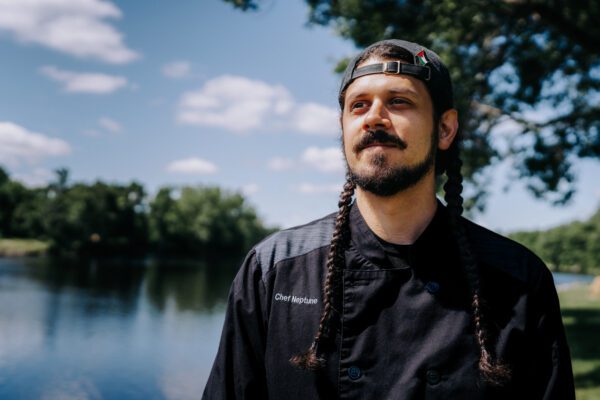
Name: Zack Neptune
Location: Penobscot Nation Reservation
Education/background: Chef/Restaurant Management
Business name/title: Katahdin Kitchen
Tribal affiliation: Penobscot Nation Descendant
What led to your passion for indigenous foods?
My passion for indigenous foods truly began just a few years ago, though I can remember times of food insecurity while growing up that helped shape who I am and what I believe. The moment I realized that food, specifically indigenous food, was where I needed to put my energy was at the beginning of the COVID pandemic. I saw so clearly how fragile our current food system infrastructure is and how heavily dependent a huge portion of society is on such a small variety of foods. I thought about how reliant our communities used to be on each other and how desperately we need to return to those old ways.
By focusing on regional indigenous food, we can do many good things for our bodies, as well as the land and water with which we coexist. We restore a symbiotic and reciprocal relationship with natural, varied, and nutritious foods; we heal our bodies and spirits by stopping the consumption of highly processed and toxic food products; and we demonstrate that we are capable of challenging the corporate agriculture giants by feeding ourselves and our communities delicious and nutritious foods that are native and natural to our region.
Why do you think it’s important to make traditional foods accessible for Natives?
It is important because traditional foods and their accessibility were systematically and deliberately stripped from Native communities across the Americas. The importance of their return and accessibility cannot be overstated. These are foods and ingredients that are truly sacred and spiritually fulfilling, not only to consume but to gather and harvest as well.
It’s not just about the food; it’s about what these practices represent—a return to ways of life that were violently disrupted. By restoring these practices to their original stewards, we restore a piece of their independence, dignity, strength, and soul.
What is the importance of an indigenous diet for a healthy lifestyle?
An indigenous diet and a healthy lifestyle go hand in hand. The indigenous diet could almost be described as the perfect diet. It consists of a wide variety of proteins—from fish and seafood to deer, bison, and fowl—and fruits and vegetables like berries, apples, potatoes, corn, beans, squash, and much more, along with an assortment of nuts and seeds. All of this with minimal to no sugars, no processed foods, and no empty calories. This diet, rooted in a seasonal and active environment, is incredibly healthy for just about everyone.
What ways are you involved in the education, restoration, and accessibility of traditional native foods?
I am involved by helping operate an indigenous foods restaurant. We raise awareness of indigenous foods within the broader community and provide teaching opportunities to those outside our community. It also shows our youth that they are capable of achieving their own dreams. Additionally, I support the work of one of our co-owners, who is the Food Sovereignty and Education Director for a local organization involved in this work. We are working on acquiring space for workshops and classes focused on teaching indigenous folks and youth various skills associated with traditional and regional foods, such as foraging, animal butchery, food preparation and cooking, food curing, long-term storage, and more.
How can community members be involved and support the cause of restoring and protecting indigenous food systems?
Community members can get involved by meeting people where they are—this means reaching out to community leadership, asking folks if and how they need help, ensuring elders are cared for, and teaching youth the importance of food and food caretakers. Getting involved can look like giving your time and energy to indigenous food caretakers and challenging tribal leadership when they make decisions that aren’t in the best interest of the people. Folks can get involved by being visible and vocal in spaces where it is necessary and effective. There are so many ways to be a part of something important and bigger than ourselves as individuals. Please reach out to your local tribe and food educators to see what food projects they have going and how you can help!
